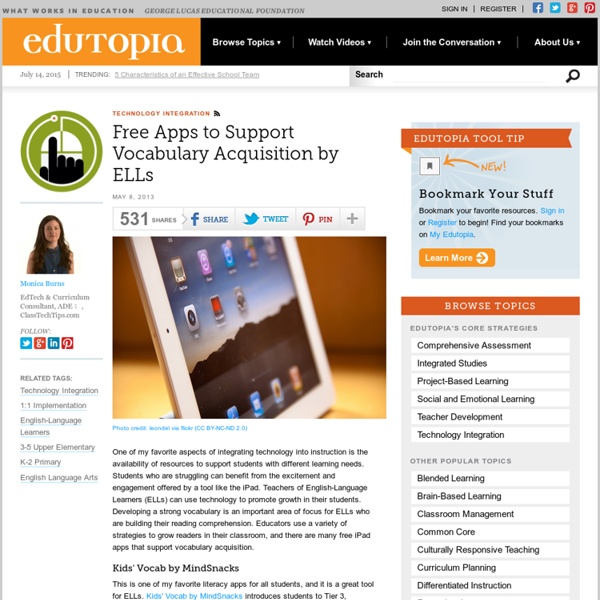Free Apps to Support Vocabulary Acquisition by ELLs

Reading Research Quarterly, Vol. 24, No. 2 (Spring, 1989), pp. 174-187
In two experiments, classroom teachers in New Zealand read stories aloud to elementary school children, and administered pretests and posttests to measure the extent of the new vocabulary the children acquired from the reading. Results showed that oral story reading constitutes a significant source of vocabulary acquisition, whether or not the reading is accompanied by teacher explanation of word meanings. In the first study, seven classes of 7-year-olds showed vocabulary gains of 15 percent from one story, without any teacher explanation.
Memorization versus semantic mapping in L2 vocabulary acquisition
Roya Khoii is Assistant Professor at Islamic Azad University, North Tehran branch. She holds a PhD in TEFL and has been teaching the related courses at the BA and MA levels for more than 20 years. She has written and translated more than 30 books and papers and spoken at several international conferences. Her research interests include CALL and teaching and testing foreign language skills. Email: roya_kh@yahoo.com Samira Sharififar holds an MA in Teaching English as a Foreign Language. This study investigated the effects of two cognitive strategies, rote memorization and semantic mapping, on L2 vocabulary acquisition.
Cervatiuc - ESL Vocabulary Acquisition: Target and Approach
The Internet TESL Journal Andreea Cervatiuc acervati (at) ucalgary.ca University of Calgary (Calgary, Canada) Introduction A widely accepted distinction related to vocabulary knowledge refers to lexical "receptive knowledge", which involves the ability to understand a word while listening or reading, versus "productive knowledge", the ability to use a word in speaking or writing (Nation, 2001, p. 25). As a rule of thumb, the receptive vocabulary is at least twice the size of the productive vocabulary. This article looks at the average receptive vocabulary size of adult native English speakers, inquires into whether non-native speakers can acquire a receptive vocabulary size comparable to that of native speakers, and discusses the amount and type of words needed for reading comprehension in a second language. The Receptive Vocabulary Size of Adult Native English Speakers Can Adult Non-native English Speakers Acquire a Receptive Vocabulary Size Comparable to That of Native Speakers? Table 1.
Related:
Related:



